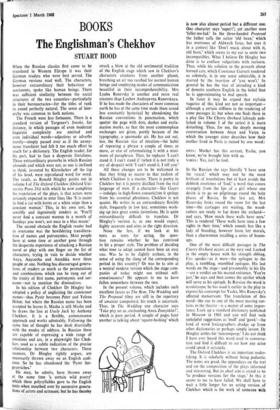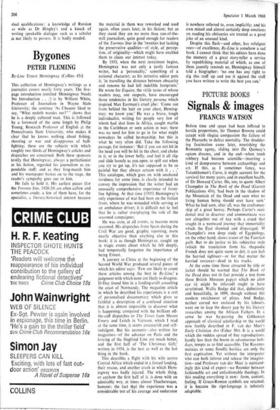The Englishman's Chekhov BOOKS
STUART HOOD
When the Russian classics first came to be translated in Western Eitrope it was their German readers who were best served. The German versions read well. The characters, however , extraordinary their behaviour or sentiments, spoke like human beings. There was sufficient similarity between the social structures of the two countries—particularly in their bureaucracies—for the titles of rank to sound perfectly natural. The sense of hier- archy was common to both nations.
The French were less fortunate. There is a standard version of Turgenev's Smoke, for instance, in which passages of even moderate linguistic complexity are omitted and even individual words—adjectives or adverbs mostly—simply passed over as if the anony- mous translator had felt it too much effort to reach for a dictionary. The English reader, for his part, had to face a desperate literalness. Those extraordinary proverbs in which Russian abounds and which were not, as one is inclined to think, invented by Khrushchev off the top of his head, were reproduced word for word. The result, as Ronald Hingley points out in volume I of The Oxford Chekhov (Oxford Uni- versity Press 35s) with which he now completes his translation of the plays, is that actors were seriously expected to utter lines like 'It is easier to find a cat with horns or a white snipe than a constant woman.' This, in his own text, he sensibly and ingeniously renders as 'You'll never find a constant woman in a month of Sundays you won't, not once in a blue moon.'
The second obstacle the English reader had to overcome was the bewildering translitera- tion of names and patronymics. Most people have at some time or another gone through the desperate experience of attacking a Russian novel or play with one finger on the list of characters, trying in vain to decide whether Anya, Anyoosha and Anochka were three people or one. Nothing has discouraged genera- tions of readers so much as the permutations and combinations which can be rung out of the trinity of first name, patronymic and sur- name—not to mention the diminutives.
In his edition of Chekhov Dr Hingley has adopted a policy of anglicising the commoner names—thus Pyotr becomes Peter and Yelena Helen; but where the Russian name has been accepted he leaves it. Masha is still Masha and he draws the line at Uncle Jack by Anthony Chekhov. It is a flexible, commonsense approach and works admirably. Following the same line of thought he has dealt drastically with the modes of address. In Russian these are capable of expressing a wide range of emotions and are, in a playwright like Chek- hov, used as a subtle indication of the precise relationship between two characters. These nuances, Dr Hingley rightly argues, are necessarily thrown away on an English audi- ence. So he has abandoned the `Pyotr Ser- geyeviches.'
He may, he admits, have thrown away at the same time 'a certain wild poetry' which these polysyllables gave to the English texts when mouthed over by successive genera- tions of actors and actresses; but he has thereby struck a blow at the old sentimental tradition of the English stage which saw in Chekhov's characters creatures from another planet, breathing an air too rarefied for normal human beings and employing modes of communication beautiful in their incomprehensibility. Mrs Lyuba Ranevsky is another and more real creature than Lyubov Andreyevna Ranevskaya. If he has made the characters of more common earth he has at the same time made them sound less constantly hysterical by abandoning the Russian conventions in punctuation, which spatter the page with dots, dashes and excla- mation marks, so that the most commonplace exchanges are given, purely because of the typography, a spasmodic air. He has cut out, too, the Russian vice of iteration—the habit of repeating a phrase a couple of times or more, or else of reformulating it with a mini- mum of paraphrase. Thus, he replaces 'I can't stand it. I can't stand it' (when it is not truly a cry of despair) with 'I can't stand it, I tell you.'
All these changes are to be welcomed in that they bring us nearer to that realism of which Chekhov is a master. There is poetry in Chekhov but it is poetry distilled from the real language of men. If a character—like Gayev —indulges in high-flown romanticism it springs from his essential phoniness. Chekhov is not quaint. He writes in an extraordinary flexible style, frequently in low key, sometimes work- ing up into great comic inventions. He is quite extraordinarily difficult to translate. Dr Hingley's version is, as one would expect, highly accurate and aims in the right direction.
None the less, if we look at his texts as texts for acting, the ques- tion remains whether he has contrived to hit a proper style. The problem of deciding what tone to adopt cannot have been an easy one. Was he to be slightly archaic, in the sense of using the slang of the corresponding period in this country? Or was he to aim at a neutral modern version which the stage com- panies of today might use without self- consciousness? He appears to me to have fallen somewhere between the two.
In the present volume, which includes such excellent farces as The Bear, The Wedding and The Proposal (they are still in the repertory of amateur companies), his touch is uncertain. Thus, in The Wedding one character says 'Take pity on us, enchanting Anna Zmeyukin!', which is pure period. A couple of pages later another is talking about 'square-bashing' which
is now also almost period but a different one. One character says `super!'; yet another uses `feller-me-lad.' In the three-handed Proposal the father calls the suitor 'old bean,' which has overtones of Aldwych farce, but uses it in a context like 'Don't muck about with it, old bean,' which seems to my ear to unite two incompatibles. What I believe Dr Hingley has done is to confuse vulgarisms with raciness. Thus, while his solution to the proverb about horned cats, which Constance Garnett rendered so solemnly, is in one sense admirable, it is marred by the insertion of 'you won't.' In general he has the vice of intruding a kind of demotic southern English in the belief that he is approximating to real speech.
In farce it may be argued that stylistic vagaries of this kind are not so important— although a certain stiffness in the rendering of some passages is; but when one finds them in a play like The Cherry Orchard (already pub- lished in volume 3 of the series) it is more disturbing. Thus, for me, the deeply moving conversation between Anya and Varya in which the younger sister describes how their mother lived in Paris is ruined by one word:
ANYA : Mother has this servant, Yasha, you know, we've brought him with us. VARYA : Yes, isn't he foul.
In the Russian she says literally 'I have seen the rascal,' which may not be the most brilliant of translations but at least avoids the debbish overtones of 'foul,' a word that comes strangely from the lips of a girl whose one desire is to go on pilgrimage round the holy places of Russia. In the last act, Mrs Ranevsky looks round the room for the last time—the carriages are waiting, the wood- cutters are ready to lop down the orchard— and says, 'How much these walls have seen.' This is rendered 'These walls have seen a few sights in their time,' which sounds less like a lady of breeding, however loose her morals, than a charwoman recalling a series of booze- ups.
One of the most difficult passages in The Cherry Orchard occurs at the very end. Locked in the empty house with his strength ebbing, Firs speaks—as it were—the epilogue to the play, a rambling, mumbled epilogue. His last words on the stage—and presumably in his life —are a verdict on his wasted existence. 'You're just,' he says and then comes the epithet which will serve as his epitaph. In Russian the word is nyedotyopa; he has used it earlier in the play to express his contempt for Yasha, Mrs Ranevsky's affected manservant. The translation of this Nord—the cue to one of the most moving cur- tains in the theatre—is a matter of some impor- tance, Look up a standard dictionary published in Moscow in 1965 and you will find such unhelpful suggestions as 'muff' and `gawk'—the kind of word lexicographers dredge up from other dictionaries or perhaps simply invent. Dr Hingley settles for 'nincompoop.' I do not think I have ever heard this word used in conversa- tion and find it difficult to see how any actor could speak it seriously.
The Oxford Chekhov is an important under- taking. It is scholarly without being pedantic. The notes are good, the appendices on the text and on the composition of the plays informed and interesting. But its chief aim is stated to be `to produce versions for the stage.' In this it seems to me to have failed. We shall have to Wait a little longer for an acting version of Chekhov which is the work of someone with
dual qualifications: a knowledge of Russian as wide as Dr Hingley's and a knack of writing speakable dialogue such as a scholar is not likely to possess. It is badly needed.



































 Previous page
Previous page